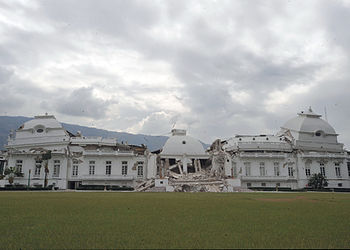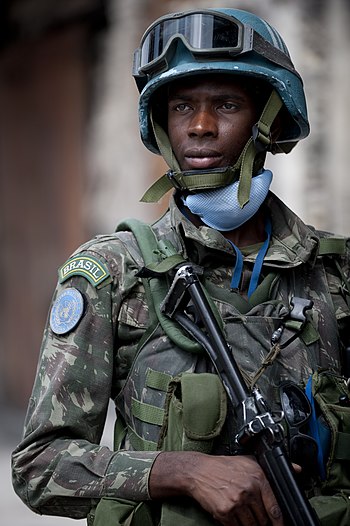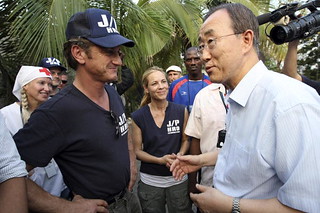| Debris in the streets of the Port-au-Prince neighborhood of Bel-Air, in the aftermath of the 2010 Haiti Earthquake. (Photo credit: Wikipedia) |
| Street-view of the National Palace of Haiti, destroyed by the 2010 Haiti Earthquake. (Photo credit: Wikipedia) |
| MINUSTAH peacekeepers continue to work to find survivors after after an earthquake measuring 7 plus on the Richter scale rocked Port au Prince Haiti just before 5 pm yesterday, January 12, 2010. (Photo credit: Wikipedia) |
| A Brazilian soldier stands security in Port-au-Prince, Haiti, during a visit by U.S. Navy Adm. and Chairman of the Joint Chiefs of Staff Mike Mullen. (Photo credit: Wikipedia) |
| English: Jean-Bertrand Aristide meets Bill Clinton in the Oval Office, October 14, 1994. (Photo credit: Wikipedia) |
| Secretary-General Meets Actor and Humanitarian Sean Penn at Haiti IDP Camp (Photo credit: United Nations Photo) |
Haiti appears to be a puzzling country. To judge by the
news stories that come out of it after each successive disaster, it is the most
corrupt and mercilessly exploited nation in the world. Yet people with a closer
knowledge of the place insist it is a nation of magical people whose culture,
based on religion, is so strong as to be unbreakable by no matter what disasters
may befall them.
These two sides of the country were on display last night
when filmmaker Joseph Hillel --- a small, mildly spoken, and apparently highly
intelligent man --- presented his 82 minute documentary Ayiti Toma, the Land of the Living
at Cinema Politica Concordia to a sizeable, and apparently
knowledgeable audience who engaged him in
a lively discussion after the screening.
Using anthropologists, historians, economists and
spiritual leaders as interlocutors he presented the Haitians as an
exceptionally cultured and artistic people whose main characteristic is their
lively imagination.
One group of citizens from one of the poorest sections of
Port au Prince, the national capital, that was largely destroyed by the earthquake
a few years ago, told us that they have all the people needed to rebuild their
community, if only they could get their hands on the resources --- primarily
money and materials --- needed to do the job.
They were impressive as they made this argument, but it is about the
closest the documentary came to suggesting actual means by which the situation
in Haiti, acknowledged to be disastrous because of outside interference, could
be improved.
Much of the film concentrated on religious observances: it
was an amazing sight to see lines and lines of people on their way to some
religious observance or another emerging from the surrounding chaos all
beautifully dressed in spotlessly clean white gowns. These line-ups appeared to
go nowhere in particular and to be replaced by equally impressive lines of
women wearing the most colorful costumes imaginable as they marched on their
way to some other observance.
A great deal of time was given to explaining voodoo, as a
more or less normal religion, with a sort of implied suggestion that if Haiti
could be freed from outside well-wishers and do-gooders, the voodoo priests and
their followers would take care of everything. (The evidence of the presence of
the United Nations, at present the occupying power in Haiti, came with shots of
whole parking lots filled with their jeeps and pick-up trucks waiting to spring
into action around the country.
Commentators made clear their belief that MINUSTAH, the occupying power, had
failed in its proclaimed mission to uplift the country’s life.)
I always look for messages in documentary films, and one
message I got from this was that the Haitian people, deeply admirable as they
are, have been waiting for God to help them, and while waiting they have become
the most brutally exploited nation on earth. It made me think a little of Quebec when I
first came to live here in the 1950s. One could say that at that time, God was running
things, and not doing a particularly good job of it. So in 1960 and thereafter
Quebec decided to put God in his place, since when things have been going along
much better than before. I was left with
a feeling that Haiti would be well advised to put God in his place in a similar
way.
Now I don’t doubt that Haiti has been hardly used by the
international community. “Hardly used” is a euphemism for “brutally exploited.”: I acknowledge that. And I think Canada has
much to answer for because of its treatment of Haiti as one of the triumvirate
of powers with influence there. We collaborated with the Americans and the French
in removing the elected leader of Haiti in 2004, Jean-Bertrand Aristide, who
was taken to an airport and whisked away to be dropped in the Central African Republic,
of all places, and replaced by a government more amenable to American
interests. Indeed, there is a strong argument for the case that Haiti has always
been specially selected by France and the United States to be merely a source
of cheap labour for international companies, the original motive for this apparently
dating back to the 1804 slave rebellion, which set up a fear of similar revolts
throughout North and South America and the Caribbean. To these metropolitan
countries, anything would be better than the prospect of slave rebellions, and
Haiti has suffered as a consequence of its brave and successful rebellion
(which is the subject of the classic history Black Jacobins by C.L.R James, the Trinidadian historian.)
I’m not sure that Aristide was mentioned in Hillel’s movie,
but what is sure is that, ever since he made clear his preference for serving the
poor people of Haiti, he has been
opposed every inch of the way by the United States, and his recent return after
seven years of exile in South Africa was strenuously opposed by Barack Obama.
As is perfectly clear to anyone with eyes to see, any political leader wherever
he may be in the world who does not accept the United States world-view ---
which is dominated by the need to support the interests of U.S. corporations ---
can expect to face the continuing opposition of that great power. Aristide has
certainly suffered that fate.
For my taste, the vision of Haiti presented in this new
film is of a country and a people who lean too heavily on their concept of God,
and who appear not to blame their religion --- and that of others --- for their
parlous state.
The proceedings opened last night when a young man whose name
I did not catch showed the first part, quite brief, of a film he and his
supporting group are working on under the title Democracy in Haiti. The extract
shown was of a graffiti artist working in Port au Prince, a wonderfully
imaginative and talented artist, more
of whose work I am anxious to see when that film is finished.
Meantime there is a great deal of activity in Montreal in
the coming week or so that is relevant to this subject. A Haitian lawyer called Mario Joseph is
currently on a tour of Canada, and he will speak at the Centre St.Pierre at
1212 Rue Panet, close to Beaudry, on Thursday of this week at 6 pm. Then from
today until March 1 a programme of films is being screened on the subject of
LGBT rights in Africa and the Caribbean, by an outfit called Massimadi, at the
Cine du Parc, and in the D.B Clarke Cinema at Concordia University.







No comments:
Post a Comment